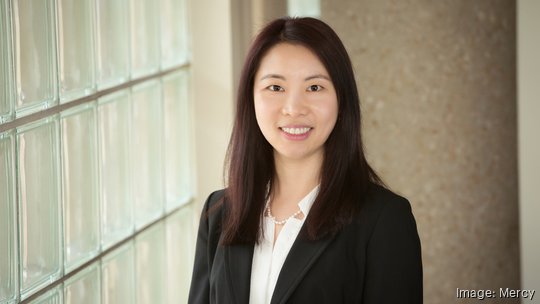
Jiajing Chen had a desire to improve health care outcomes for patients.
“It was a true passion of hers,” said Kerry Bommarito, vice president of enterprise data science at Chesterfield-based Mercy.
With that in mind, Bommarito knew exactly the project to assign Chen when she joined Mercy, the $8 billion health system, as a data scientist in 2019. Chen was tasked with developing a predictive model that could be used to determine when cancer patients receiving chemotherapy could be at risk of hospital admission from side effects of the treatment. It’s a project that ultimately turned personal for Chen, who in 2022 was diagnosed with lymphoma and died in January 2023 at age 42.
Chen’s legacy lives on as the predictive technology she worked to create has been used with more than 5,000 patients, Mercy said. It also has been named in her honor: the Chen Chemotherapy Model. It’s a tool that involves patients texting about symptoms they are experiencing from chemotherapy, and using artificial intelligence technology to assess when a patient might be at risk for hospitalization. It’s designed to help patients manage side effects of chemotherapy and reduce hospitalizations due to the treatment. About 15% of patients who had chemotherapy at Mercy from 2021 to May 2023 were admitted to the hospital within 30 days of a chemotherapy treatment, according to data from the health system.
Chen began working on the predictive modeling that’s the backbone of the technology after joining Mercy in 2019. An initial version of the program was first used with patients in May 2020, with a focus on using patient data from electronic health records to determine which cancer patients might be most at risk for hospitalization from chemotherapy. The development of the program led to Mercy winning an Innovator Award from the Association of Community Cancer Centers in 2020.
How does Mercy’s AI texting technology work?
Since its initial launch, the Chen Chemotherapy Model has been retooled to be interactive with cancer patients receiving chemotherapy. It launched its texting version of the program in November, with 5,000 cancer patients having received texts. Patients receive daily text messages asking them to provide ratings of how they are feeling in terms of different side effects, including diarrhea, pain, fever, fatigue and nausea. The program’s technology is designed to assess the ratings given by patients and create a “risk score.”
Mercy said its chemotherapy texting program is the “first of many use cases made possible” through a collaboration it has formed with Microsoft on incorporating technology, including AI, into its patient care.
The Chen Chemotherapy Model also aims to give cancer patients access to a tool that allows them to communicate directly with medical staff. The risk scores are designed to alert medical professionals to interact as soon as possible with a patient once a medical concern is flagged.
"Historically, we have not known which patients are having a problem until they presented to the ER or called the office, which was typically late in the day when we had limited options available," said Jay Carlson, Mercy Cancer Care Performance Acceleration medical director. "The Chen Chemotherapy Model and smart texting allows us to proactively manage these patients and identify when they are having problems earlier in the journey.”
Leaving a legacy
Chen is survived by her husband, Andy Greenwood, and two children: 4-year-old daughter Evelyn and 1-year-old son Ian. Greenwood, a music professor at Southern Illinois University Edwardsville, said he and Chen had their first date in 2015 at John D. McGurk’s in Soulard.
“I remember it very clearly the moment we met,” Greenwood said. “She let me know pretty early she was very serious and wanted to go further. We ended up getting engaged pretty fast and got married about a year later.”
Greenwood said Chen had studied medicine in China before moving to the U.S. with her family. After relocating to the U.S., she began a career in public health, earning a master of public health degree in biostatistics and epidemiology and Ph.D in health outcomes research, both from Saint Louis University. She used those degrees to put a focus on using predictive analytics and data science in health care.
“She was actually doing that stuff before it was kind of called that in the health care field. She had a very specialized and unique set of skills,” Greenwood said.
Prior to joining Mercy, Chen had been an assistant professor at SLU’s department of health and clinical outcomes research.
Greenwood said Mercy’s decision to name its new chemotherapy texting program after Chen leaves behind a legacy he can share with their two children, providing an outlet to tell them about her passion for her work. He said his wife’s death not only leaves a loss for her family, but also the health care field.
“I’m also sad for the loss to the health care industry because Jaijing could have done so much more over her career,” he said.
At Mercy, Bommarito said naming the technology after Chen both honors her legacy and also offers an inspiring story to tell cancer patients when educating them about the texting program. She said she believes that will help increase use by patients, meeting Chen’s goal in developing the technology.
“What she loved to do is help people,” Bommarito said.












